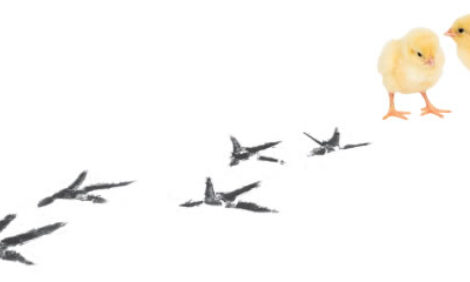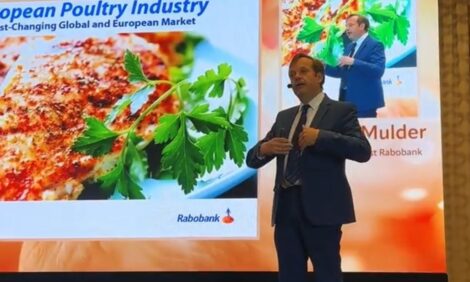



New tool available to fight avian metapneumovirus (aMPV) in the US
Vaccine import permit granted to Zoetis to control turkey rhinotracheitis (TRT), a respiratory disease caused by aMPVBrandon Marshall, head of sales and technical services with Zoetis Poultry, and Dr. Kalen Cookson, Director of Clinical Research with Zoetis, spoke to The Poultry Site’s Sarah Mikesell about the serious disease threat posed by avian metapneumovirus (aMPV) to the U.S. poultry industry, especially turkey producers. They also shared background on Zoetis’ modified-live vaccine, Poulvac TRT, that was granted an import permit by USDA Center for Veterinary Biologics (CVB) in January 2025.
Editor’s note: this interview has been edited for length and clarity.
Brandon, can you walk us through steps Zoetis has recently taken to help customers address avian metapneumovirus (aMPV)?
At Zoetis, we have a deep respect for and understanding of poultry producers and the challenges they face day in and day out. It's a challenging business as it is, but when emerging diseases come along, it can have a significant impact.
Zoetis is committed to bringing solutions to the table to help address customer issues and needs. We are excited to have a vaccine that was already in our global portfolio that could help address this problem.
Can you describe the collaboration and commitment that went into gaining this import permit from USDA's CVB?
Since aMPV reemerged in the United States in 2023, this process has taken some time. I would describe it as a very collaborative, industry-aligning initiative. It took everybody from our technical service veterinarians who worked very closely with producers to help isolate, diagnose and get their arms around what our customers were struggling with to various internal teams working in coordination to bring this option to our customers.
At the same time, we are extremely appreciative of all the efforts of the National Chicken Council, the National Turkey Federation and the United Egg Producers. These allied organizations have been instrumental in working directly with the CVB and others at USDA to help bring solutions – whether it be a killed vaccine or a modified live vaccine – from outside the United States to make them available to customers.
It's a very competitive industry but in situations like this, you see that the passion brings the entire industry together to make this a non-competitive issue. We all work together to make solutions available.
Dr. Cookson, let’s talk about this disease. What is avian metapneumovirus and how does it impact poultry health and performance?
First, it's a little bit of a mouthful, and it goes by a number of acronyms – aMPV is what most call it. But in the turkey industry, it's also known as TRT or turkey rhinotracheitis. And in broilers, it's sometimes referred to as SHS or swollen head syndrome.
The key issue is it's an upper respiratory virus, and turkeys are the most susceptible, followed by chickens. aMPV has a propensity for the head. It basically causes a bad head cold via deciliation of the respiratory linings, resulting in upper respiratory cold symptoms including head shaking, conjunctivitis, swollen sinuses, watery eyes and nasal exudate, and coughing.
aMPV usually leads to secondary bacterial infections that can impact animal performance. Turkeys tend to get E. coli infections and ORT (Ornithobacterium rhinotracheale) infections, which can really persist. If birds have a persistent head cold, they are going to be constantly fighting off disease and taking resources away from growth and reproduction. Thus, the animal is going to expend a lot of energy fighting off secondary disease, and a lot of times they can even succumb to these secondary infections.
We've seen mortality in turkeys this past year as high as 60%. If you look at the textbooks, it's typically not more than 30% to 40%. That speaks to the fact that we haven't had any vaccines for this disease in the U.S., so we have completely naïve flocks being impacted—not to mention the prevalence of E. coli and ORT.
How quickly can it spread?
It spreads extremely efficiently. For people who aren't familiar with this disease, especially those in the chicken industry, it has a lot of similarities to infectious bronchitis, which also damages the lining of the respiratory tract and leads to secondary infections. aMPV is a fairly fragile virus outside the bird but, because it is so infectious and transmissible, it can stay alive on premises and spread easily between farms by bird movement or contact with infected clothing or equipment.
Outbreaks tend to be more common and severe in the wintertime, so it's seen as a winter respiratory disease. The virus never really goes away in the summer, but it seems to be a little quieter in the summer when there’s better ventilation and heat. In the wintertime its numbers build back up and that's why we saw it emerge last winter—and now it's coming back strong this winter.
Tell us about Zoetis' Poulvac TRT vaccine that was recently granted an import permit for use in the United States?
There are two vaccination options for this disease: modified-live vaccines and inactivated vaccines. Zoetis’ vaccine is a modified-live vaccine that has been available in global markets for the past 20 years. There are more than two virus types, but the prevalent ones are types A and B, and that's what we're seeing in the United States just like in Europe and Brazil.
When we're raising birds for meat production, we don't have the opportunity to individually handle the birds except in the hatchery on the first day, which is where live respiratory vaccines can be administered successfully.
Live vaccines are also extremely important for breeder-type birds in both turkeys and chickens because younger birds are more susceptible to this virus before we have an opportunity to administer killed vaccines. Killed vaccines are very helpful for protecting hens throughout lay from respiratory disease as well as egg production losses.
We look forward to our ongoing work with turkey customers on better understanding aMPV and will help them utilize vaccines as supplies become available.
For questions about Poulvac TRT, please contact your Zoetis representative.
All trademarks are the property of Zoetis Services LLC or a related company or licensor unless otherwise noted.
©2025 Zoetis Services LLC. All rights reserved. BIO-00427









